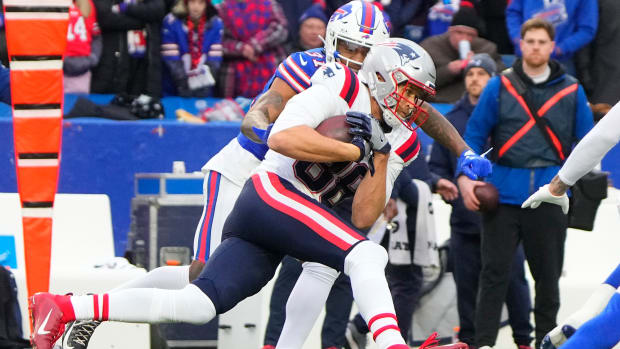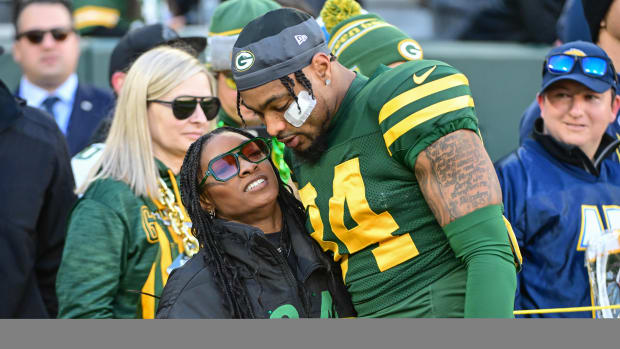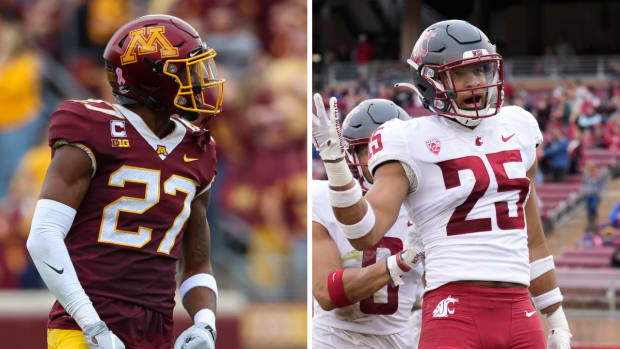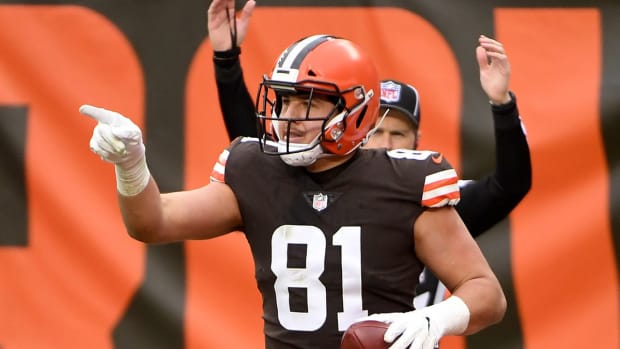In Retiring, Tom Brady Made Yet Another Shrewd Choice
Tom Brady’s defining football characteristic was his ability to make the correct choice: to change the play before the snap, to throw to the right receiver, to get rid of the ball when nothing was there, to manage end-of-game situations in real time. It is appropriate, then, that he ultimately retired at precisely the right time, too. After the longest career of any non-kicker in history, Brady stuck the landing.
If Brady wanted to keep playing, to squeeze a little more football out of himself–to lick the bottom of the bowl, as my colleague Jon Wertheim has written of the Roger Federer/Rafa Nadal/Novak Djokovic triumvirate–then that was his right. There would have been a market for him. But it almost certainly would not have been pretty.
It became clear this past season that Brady was no longer playing like a star. Some of his numbers were still impressive, and he still had that incredible late-game poise. But he also missed more receivers than he did even a year ago. The Buccaneers were injured and offensively dysfunctional, but there were also too many plays when a better version of Brady would have made something work. If you forgot that he was the most accomplished player in NFL history and just compared him to other players in the league, you would have seen Tom Brady, in 2022, as just an average starting quarterback.
So these were his options if he chose to keep playing:
1. Go back to Tampa, and trust that a new offensive coordinator (Byron Leftwich got fired last month), better health and a few personnel changes would make the Bucs contenders again.
2. Sign with another team as a free agent. The Raiders, coached by Brady’s former coordinator Josh McDaniels, always felt like the most likely option. The Jets made some football sense, though not emotional sense. The 49ers, his childhood team, always held sentimental appeal. Maybe another suitor would have emerged.
Neither of these options were all that great. I don’t know how anybody could have watched the Bucs this year and envisioned another boat parade next year, even if the whole team was injury-free. As for the Raiders and Jets: who really thinks Brady was going to emerge from an AFC pack that includes Patrick Mahomes, Joe Burrow, Josh Allen, Trevor Lawrence, Justin Herbert and Tua Tagavailoa? And if the 49ers even wanted Brady this offseason, then he would have faced the very real possibility of fearless Kyle Shanahan benching him in favor of Brock Purdy.
Going to another team was the worse of those two options, because at least if he stayed in Tampa, we would always remember that he won a Super Bowl there. Imagine Brady slogging through a 7-10 season in Las Vegas. “Brady with the Raiders” would have replaced “Willie Mays with the Mets” as the overused-but-obvious example of a player staying on too long.
And yet … Tom Brady did not become who he is by doubting himself. It would have been so easy for him to blame Leftwich for his own decline, to convince himself he was still the best there is, to keep chasing rainbows. Drew Brees was physically beaten when he retired. Peyton Manning was nowhere near his former self. Brady was just good and healthy enough to see whatever he wanted to see in the mirror.
He retired anyway. Smart move, after a lifetime of smart career moves. He chose to play in college at Michigan even though it was far from home, and stayed there even when the coaches seemed more enamored of other quarterbacks. He competed like a starter in New England when there was no indication he would start, and he handled the public scrutiny of the Drew Bledsoe competition like a 10-year vet. He managed to earn more than $300 million in his career while always ensuring that his contract allowed the Patriots to build a championship roster around him.
Most impressive of all: Brady stayed in New England until the exact moment when it was time to leave, and then he chose the perfect landing spot when it was not obvious. That required adept planning (he and agent Don Yee convinced the Patriots to sign him to a deal where they could not franchise-tag him after the 2019 season) and composure during a season of speculation. And in going to Tampa, he found a team with a roster that was ready to win but had not won, giving him a chance to win the Super Bowl (which he did) without any risk that people would say he ruined a Super Bowl contender.
Brady made a rare public misstep when he retired and unretired last year. But whatever his reasons for doing that, coming back was probably the right call, if only because it gave him a chance to decline a little more. That must have eliminated lingering questions in his head about whether he could have won another Super Bowl. Brady got exactly what he wanted out of his Tampa experience. But he wasn’t going to get any more.
So what now? After last year, there will be some skepticism about his announcement, understandably. I believe he is retired “for good,” as he says, because in 25 years of watching Brady, I rarely saw him make the same mistake twice
I am skeptical on another front: Until Brady is actually in a booth calling games for Fox, I won’t really believe it. I don’t think either Brady or Fox fully thought that deal through when they signed it. But signing with a network is not like signing with a team; if Brady bails, he won’t anger a fan base. All he really did when he signed with Fox was give himself an appealing option if he wanted it. Tom Brady, deft to the end.




































